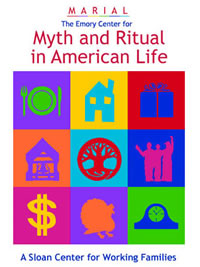The
way families communicate and share stories–such as
reminiscing about a beloved pet that died or recounting
episodes from a favorite trip–can have an impact
on their children’s well being, according to researchers
from Emory’s Center for Myth and Ritual in American
Life.
 Samuel
Candler Dobbs Professor of Psychology Robyn Fivush and
Charles Howard Candler Professor of Psychology Marshall
Duke decided to find out more about family members’
interactions by recording the mealtime conversations of
forty families in metro Atlanta.
Samuel
Candler Dobbs Professor of Psychology Robyn Fivush and
Charles Howard Candler Professor of Psychology Marshall
Duke decided to find out more about family members’
interactions by recording the mealtime conversations of
forty families in metro Atlanta.
Families
were encouraged to talk about shared events and experiences
(“Tell us about a vacation, a family reunion, or
the birth or death of a family member”), and the
children were questioned about their family’s history
(“Do you know how your parents met? Where they grew
up? Where they went to school?”).
After
observing the families and analyzing transcripts, Fivush
and Duke discovered that the amount of family history
known by a child is related to the child’s level
of self-esteem and how well the family functions as a
whole.
“These
narratives, often told again and again, define the shape
of each family’s emotional life,” says Fivush.
“It’s not as if children who come from families
that don’t tell stories turn out to be juvenile delinquents.
But this is an important way in which children understand
themselves, who they are and what they are a part of,
and how to feel emotionally secure.”
Stories
about family heroes–relatives or ancestors who did
something good or who survived hard times–are particularly
effective in providing children with a sense of family
continuity and resilience. “Rather than minimizing
the possibility that more bad things will happen,”
Duke says, “we have to teach children how to overcome
troubled times.”
The
telling of detailed, embellished, and emotionally rich
family stories appears to be a skill that is passed down
through the generations.
“Parents
and children [who tell stories] of their shared past are
creating and maintaining strong and secure emotional bonds,”
says Fivush. “Family narratives are not simply about
what has happened in the past; they are very much a part
of the way in which families recreate themselves . . .
in the present.”–M.J.L.